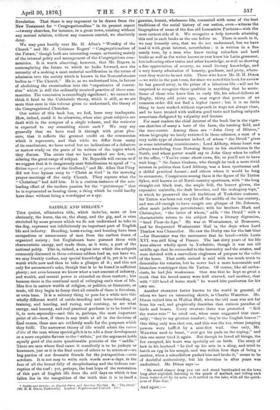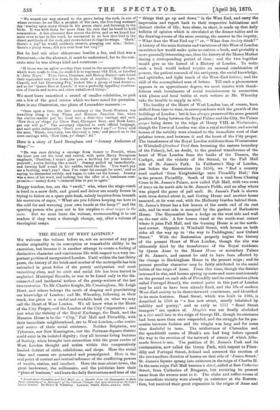SADDLE AND SIRLOIN.*
THIS quaint, alliterative title, which includes, more or less obviously, the horse, the ox, the sheep, and the pig, and is even stretched by some process which we do not understand to take in the dog, expresses not infelicitously an important part of English life and industry. Breeding, horse-racing, and hunting have been occupations or amusements of men from the earliest times of organized society ; but Englishmen have pursued them with characteristic energy, and made them, as it were, a part of the national polity. This is, indeed, a region into which the subjects commonly discussed in these columns seldom lead us, nor have we, we may frankly confess, any special knowledge of it, yet it is well worth while now and then to take a glimpse of it ; and this not only for amusement's sake, though that is to be found in sufficient plenty; not even because we know what a vast amount of industry, and wealth, and mental power is extended on these matters ; but because there is the continual need of enlarging one's view of life. Men live in narrow worlds of religion, or politics, or literature, or trade, till they begin to fancy that all outside of these is frivolous, or even base. It is a salutary thing to pass for a while into this wholly different world of cattle-breeding and horse-breeding, of training, and hunting, and racing, and coursing, to see what energy, and honesty, and real practical goodness is to be found in it, to note especially—and this is, perhaps, the most important point of all—how, if there is any truth at all in the doctrine of final causes, these men are evidently made for the purposes which they fulfil. The narrowest theory of life would admit the raison d'être of the man whose special gift it is to add a finer development or a more exquisite flavour to the " sirloin," yet the argument holds equally good of the more questionable pursuits of the " saddle." There are men whose final cause it manifestly is to be jockeys or huntsmen, just as it is the final cause of others to be actors or—we beg pardon of our dramatic friends for the juxtaposition—even acrobats. It is not easy to write such words now-a-days, in the face of all the brutal folly of steeplechasing and the hideous cor- ruption of the turf ; yet, perhaps, the best hope of the restoration of this part of English life from the evil days on which it has fallen lies in the recognition of the truth that it is in itself a • Saddli and Sirloin: or, English Farm and Sporting Worthies. By " The Druid" (Hr. H. H. Dixon, Parkworth) London : Rogerson and Taxford. 1870. genuine, honest, wholesome life, connected with some of the best traditions of the social history of our nation, even—witness the biographies of some of the fine old Lancashire Puritans—with the most earnest side of it. We recognize a help towards attaining this end in such books as the one before us. There is much in it, we may honestly own, that we do not understand, but we have read it with great interest, nevertheless ; it is written in a fine manly tone, by a man who knew racing calendars and herd books as well as the writer knows or ever knew his Latin grammar, but indicating other tastes and other knowledge, as well as showing a fine appreciation of scenery, no small literary knowledge, and a very hearty admiration of honesty, goodness, and piety, where- ever they were to be met with. Those who knew Mr. H. H. Dixon —we write in the past tense, for since we noted this book for review he has passed away, iu the prime of a laborious life—will not be surprised to recognize these qualities in anything that he wrote. Some of those who knew him in early life, his school-fellows at Rugby, thirty odd years ago, may regret that powers of no common order did not find a higher career ; but it is no little thing to have worked without reproach in ways not always clear, and to have treated with uniform good taste and feeling subjects sometimes disfigured by vulgarity and licence.
For most readers the chief interest of the book lies in the vigor- ous sketches of many a hero of the farm, the hunting field, and the race-course. Among these are " John Grey of Dilaton," whose biography we lately reviewed in these columns, a man of a very noble type of character indeed, of whom " the Druid" gives us some interesting reminiscences ; Lord Althorp, whose heart was always wandering from Downing Street to his shorthorns in the North, and whose porter would say to John Grey when he called at the office, "You've come about cows, Sir, so you'll not to have wait long ; " Sir James Graham, who though he took a more vivid interest in politics than Lord Althorp, was a keen sportsman and a skilful practical farmer; and others whom it would be long to enumerate. Conspicuous among these is the figure of Sir Tatton Sykes, well known to all North-country sportsmen, with " the long straight•cut black coat, the ample frill, the beaver gloves, the expansive umbrella, the drab breeches, and the mahogany tops," in which he preserved the old traditions of Yorkshire costume. Sir Tatton was born not very far off the middle of the last century, and was old enough to have caught one glimpse of Dr. Johnson, after much judicious perseverance, with his brothers Mark and Christopher, " the latter of whom," adds " the Druid" with a characteristic return to his subject from a literary digression, " bred Fleur-de-Lys." Ile was at Westminster, at Braseuose, and be frequented Westminster Hall in the days when Lord Thurlow was Chancellor. He saw the Derby run for the last time —for Doncaster was the racecourse that he loved—while Louis XVI. was still King of France. The last sixty years of his life were almost wholly spent iu Yorkshire, though it was not till middle age that he succeeded to the baronetcy and the estates, and were devoted with a marvellous singleness of purpose to the callus of the horse. That noble animal is said with too much truth to demoralize his votaries, but he never had a more honourable and blameless worshipper than Sir Tattoo. Of course, like all enthu- siasts, he had this weaknesses. One was that he kept so great a stock that his brood mares were half starved, and another, that with "320 head of horse stock" he would hire posthorses for his own use.
Another character better known to the world in general, of whom we have an interesting sketch, is Charles Waterton. Mr. Dixon visited him at Walton Hall, when the old man was not far from his end, and graphically describes that curious paradise of birds and beasts. Every creature there was protected. " Kill the water-rats !" he cried out, when some suggested that enor- mity; "they're my greatest comfort; they're the English beaver !" One thing only was shut out, and this was the fox, whose jumping powers were baffled by a nine-feet wall. One only, Mr.
Waterton used to boast, " ever got his pads on the coping," and this one never tried it again. But though he loved all things, the fox excepted, his heart was specially set on birds. The story of how in his boyhood "he tied up his arm in a sling, and tried to hatch an egg in his armpit, and was within four days of being a mother, when a schoolfellow pushed him and broke it," seems to be of doubtful authenticity, but his devotion in after years was undoubted. Mr. Dixon says :-
" He would almost drag you out and stand bareheaded on the lawn long after nightfall, listening to the quack of mallard, and telling each fresh water-Iowl by its note, as it settled on the lake, with all the quick- ness of Fine-Ear."
And again :—
"We wound our way onward to the grove facing the rock, in one of whose recesses he sat like a prophet of the cave, the live-long summer day ' musing upon many things in his green chair, and listening to the birds. It was with them far more than his rats that he loved to hold communion. A hen pheasant flew across the drive, and as we heard her mate crow to her in the wood, he recounted to us how that bird is the direct antithesis of the cock, and crows before it claps its wings. 'Hark! there's a jay' he would suddenly observe, grasping our arm ; ' listen ; there's a jenny wren; did you ever hear her sing?'"
But he had otie other abhorrence besides a fox, and that was a Protestant,—in the abstract, it must be understood, for to the con- crete man he was always kind and courteous :-
"If there was an uglier monkey than usual in the menagerie offerings which were made to him, he stuffed it to represent Old Nick, or labelled it `John Knox.' Titus Oates, Cranmer, and Bishop Burnet each found their equivalent very low down in the scale of reptiles ; Mother Law, Church, and her Dissenting Fry,' looked like a group of toad dancers; and as fur ' Queen Bess at Lunch,' it was a perfectly appalling combina- tion of lizards and newts and other unhallowed things."
We must leave unnoticed a crowd of smaller celebrities, to pick out a few of the good stories which we have noted for quotation. Here is one illustration, one phase of Lancashire manners : —
"Once upon a time, the late secretary of the North-Western was travelling along a loop Wigan and Kenyon Junction line, when the station-master put his head into a first-class carriage and said, 'Now then yo' chaps for Chow Bent, Chocquer Bent, and Bank Lane. get out wid ye !' The secretary objected to such official language, and said quite indignantly, ' Don't you know who I am ?'—' Ye'es,' said the man, • Huish, secretairy, two thoosand a year,' and passed on to the next carriage with, ' Now then, yo' chaps !' dc."
Here is a story of Lord Brougham and "Jemmy Anderson of Shap :"—
" He was once driving a carriage from thence to Penritb, when the hirer put out his head and roared, with quite Harry Brougham emphasis, 'Postilion, I shan't give you a farthing for your horses or yourself ; you're driving like a snail.' Jemmy pulled up immediately, and turning half round in his saddle, faced the foe. 'You won't pay me a farthing, won't you? then I've come far enough for nowt,' and so saying, he descended swiftly, and began to take out his horses. Jemmy was a man of his word, and nothing but the offer of a handsome com- promise—' money down '—induced him to put to again."
Happy touches, too, are the "swell," who, when the stage-coach is hard in a snow drift, and guard and driver are nearly frozen in trying to fasten on a spare pole-hook, calmly inquires from beneath his mountain of capes, " What are you fellows keeping me here in the cold for and warming your own hands at the lamp ?" and the sporting parson who goes out in his surplice to shoot snipes in the snow. But we must leave the volume, recommending it to our readers if they want a thorough change, say, after a volume of theological essays.



































 Previous page
Previous page